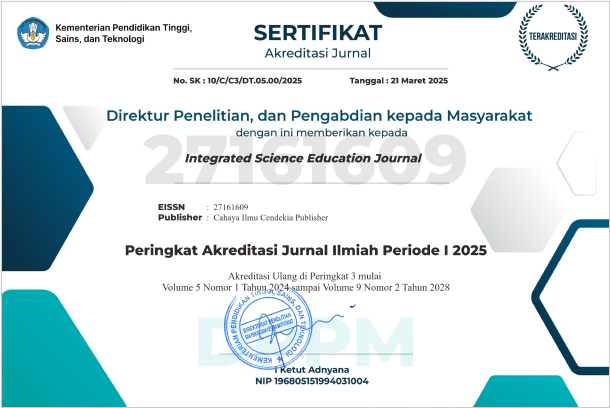The Results of Inquiry-Based Learning Management on Critical Thinking and Academic Achievement of Grade-8 Students
Abstract
Purpose of the Study: The objectives of this research were threefold: (1) to evaluate the analytical thinking ability of Grade 8 students following exposure to the inquiry-based 7E learning model, (2) to assess the academic achievements of these students both before and after engaging in 7E learning, and (3) to explore the students' satisfaction with their learning experience under the 7E framework.
Methodology: The study involved 39 Grade 8 students from a school in Kalasin province, selected via Cluster Random Sampling during the first semester of the 2023 academic year. The research utilized a pre-experimental One Group Pretest-Posttest Design, with a classroom as the sampling unit. Data were gathered through pretests, posttests, and satisfaction surveys, with a focus on measuring analytical thinking and academic achievement.
Main Findings: The study revealed three key outcomes: (1) Students' critical thinking abilities improved significantly after learning with the 7E model, with results showing a statistically significant difference at the .05 level. (2) Academic achievement post-7E learning was recorded at 70.17%, indicating a notable improvement from the pretest scores. (3) Students reported high satisfaction with the 7E learning experience, emphasizing its positive impact on learning and engagement.
Novelty/Originality of this Study: This research contributes uniquely by demonstrating the effectiveness of the 7E inquiry-based learning model in enhancing critical thinking, a vital 21st-century skill. The study also shows how the 7E model boosts student engagement and academic performance, offering an innovative approach to fostering deeper cognitive skills and academic success in a rapidly evolving educational landscape.
References
M. Akhir, J. Siburian, and M. H. E. Hasibuan, “A Study comparison the application of discovery learning and problem based learning models on the critical thinking ability”, In. Sci. Ed. J, vol. 4, no. 2, pp. 84-89, 2023, doi: 10.37251/isej.v4i2.390.
D. Herlo, E. Ambrosio, and P. Galcheva, “Analysis of the application of the group investigation learning model and its influence on students’ critical thinking abilities on chemical elements in Eastern Europe,” Jor. Eva. Edu, vol. 4, no. 4, pp. 144-150, 2023, doi: 10.37251/jee.v4i4.785
A. H. Abdullah, “Critical thinking skills among secondary school students in Brunei Darussalam: A review of literature,” Int. J. Educ. Res, vol. 2, no. 10, pp. 301-312, 2014, doi: 10.56976/rjsi.v6i2.202.
B. M. Suryonegoro, M. L. Wuryastuti, and N. R. Dewi, “Literature review: Inquiry social Complexity-STEAM model based on math trail-virtual reality activity nuanced with javanese culture in improving critical thinking ability”, Jor. Eva. Edu, vol. 5, no. 2, pp. 89-99, 2024, doi: 10.37251/jee.v5i2.863
M. A. Putri and P. A. Simbolon, “Problem Solving Learning Model and Its Correlation to Students’ Critical Thinking Ability”, Jor. Eva. Edu, vol. 3, no. 3, pp. 87-91, 2022, doi: 10.37251/jee.v3i3.263.
P. A. Facione, “Critical thinking: What it is and why it counts,” Insight Assess, vol. 1, no. 1, pp. 1-12, 2011.
P. A. Facione and N. C. Facione, The California Critical Thinking Skills Test. Millbrae, CA: California Academic Press, 1994.
M. B. Panjaitan and A. Siagian, “The effectiveness of inquiry based learning model to improve science process skills and scientific creativity of junior high school students”, Journal of Education and E-Learning Research, vol. 7, no. 4, pp. 380–386, Nov. 2020, doi: 10.20448/journal.509.2020.74.380.386.
Y. L. Rahmi, Ardi, and E. Novriyanti, “The effect of inquiry learning model using scientific approach on students' critical thinking skills,” J. Phys.: Conf. Ser, vol. 1005, no. 1, p. 012001, 2018.
D. Dakabesi, I. S. Y. Lousine, “The effect of problem based learning model on critical thinking skills in the context of chemical reaction rate,” Journal of Education and Learning (EduLearn), vol 13, no. 3, 2019, doi: 10.11591/edulearn.v13i3.13887.
P. Thaiposri and P. Wannapiroon, “The development of critical thinking skills in science learning through inquiry-based learning activities,” Proc. Soc. Behav. Sci, vol. 116, pp. 4728-4733, 2014.
M. Lee, “Critical thinking skills among secondary school students in Brunei Darussalam: A review of literature,” International Journal of Education and Research, vol. 2, no. 10, pp. 301-312, 2014.
D. Prambanan, Dila Yathasya, and P. S. A. Anwar, “Analysis of Cognitive Learning Outcomes of Compliance Personality Students in Solving Mathematical Problems”, Jor. Eva. Edu, vol. 4, no. 1, pp. 31-35, 2023, doi: 10.37251/jee.v4i1.285.
C. C. Bonwell and J. A. Eison, “Active learning: Creating excitement in the classroom,” ASHE-ERIC Higher Education Reports, vol. 6, 1991.
D. M. Ogle, “K-W-L: A teaching model that develops active reading of expository text,” The Reading Teacher, vol. 39, no. 6, pp. 564-570, 1986.
W. Harlen, “The teaching of science: A review of research in England and Wales,” Journal of Curriculum Studies, vol. 33, no. 1, pp. 1-32, 2001.
C. E., Hmelo-Silver, R. G., Duncan, & C. A. Chinn, “Scaffolding and achievement in problem-based and inquiry learning: A response to Kirschner, Sweller, and Clark (2006),” Educational Psychologist, vol. 42, no. 2, pp. 99-107, 2007.
J. Dewey, How we think. D. C. Heath & Co., 1910.
P. C. Blumenfeld, E. Soloway, R. W. Marx, J. S. Krajcik, M. Guzdial, and A. Palincsar, “Motivating project-based learning: Sustaining the doing, supporting the learning,” Educational psychologist, vol. 26, no. 3-4, pp. 369-398, 1991.
A. Polseekhaw, T. Thongsuk, & C. Hemtasilpa, “The effects of 5E inquiry-based learning activities on elementary school students' academic performance and analytical thinking skills in separation of mixtures,” Journal of Science and Science Education (JSSE), vol. 6, no. 2, pp. 228–240, 2023, doi: 10.14456/jsse.2023.20.
K. Sommer, P. Kring, C. G. Strippel, and K. Emmerich, “Teaching and Learning Scientific Inquiry–Step by Step,” CHEMKON, vol. 29, no. 5, pp. 375-381, 2022, doi: 10.1002/ckon.202000042.
M. Shah, Teaching and Learning: A Process Approach. Petaling Jaya, Selangor, Malaysia: Pearson Longman.
M. Tu'u Sincere, The impact of cultural factors on learning and achievement in Pacific Island Students. Doctoral dissertation, University of Auckland.
E. K. Nisa, T. Koestiari, M. Habibbulloh, and B. Jatmiko, “Effectiveness of guided inquiry learning model to improve students’ critical thinking skills at senior high school,” in Journal of Physics: Conference Series, vol. 997, no. 1, p. 012049, Mar. 2018.
B. D. Wale and K. S. Bishaw, “Effects of using inquiry-based learning on EFL students’ critical thinking skills,” Journal of Education and Training, vol. 5, no. 9, 2020, doi: 10.1186/s40862-020-00090-2.
M. Pedaste, G. Mitt, and T. Jürivete, “What is the effect of using mobile augmented reality in K12 inquiry-based learning?,” Education Sciences, vol. 10, no. 4, pp. 94, 2020, doi: 10.3390/educsci10040094.
K. Lu, F. Pang, and R. Shadiev, “Understanding the mediating effect of learning approach between learning factors and higher order thinking skills in collaborative inquiry-based learning,” Educational Technology Research and Development, vol. 69, no. 2, pp. 2475-2492, 2021, doi: 10.1007/s11423-021-10025-4.
S. Özkan and S. Güneş, “The Effect of Inquiry-based Learning Method on Students' Academic Achievement in Science Course.” International Journal of Instruction, vol. 11, no. 2, pp. 339-350, 2018.
J. Jerrim, M. Oliver, and S. Sims, “The relationship between inquiry-based teaching and students’ achievement. New evidence from a longitudinal PISA study in England,” Learning and Instruction, vol. 80, pp. 101310, 2022, doi: 10.1016/j.learninstruc.2020.101310.
K. Smith, and S. Brown, “Exploring the impact of the 7E learning cycle in high school biology: A mixed-methods study,” in The American Biology Teacher, 2018.
P. Onu, A. Pradhan, and C. Mbohwa, “Potential to use metaverse for future teaching and learning,” Education and Information Technologies, vol. 29, no. 7, pp. 8893-8924, 2024, doi: 10.1007/s10639-023-12167-9.
Copyright (c) 2024 Khwanjira Leekhot, Wisarut Payougkiattikun, Tawan Thongsuk

This work is licensed under a Creative Commons Attribution 4.0 International License.
Authors who publish with this journal agree to the following terms:
- Authors retain copyright and acknowledge that the Integrated Science Education Journal is the first publisher licensed under a Creative Commons Attribution 4.0 International License.
- Authors are able to enter into separate, additional contractual arrangements for the non-exclusive distribution of the journal's published version of the work (e.g., post it to an institutional repository or publish it in a book), with an acknowledgment of its initial publication in this journal.
- Authors are permitted and encouraged to post their work online (e.g., in institutional repositories or on their website) prior to and during the submission process, as it can lead to productive exchanges and earlier and greater citation of published work.







.png)
.png)






